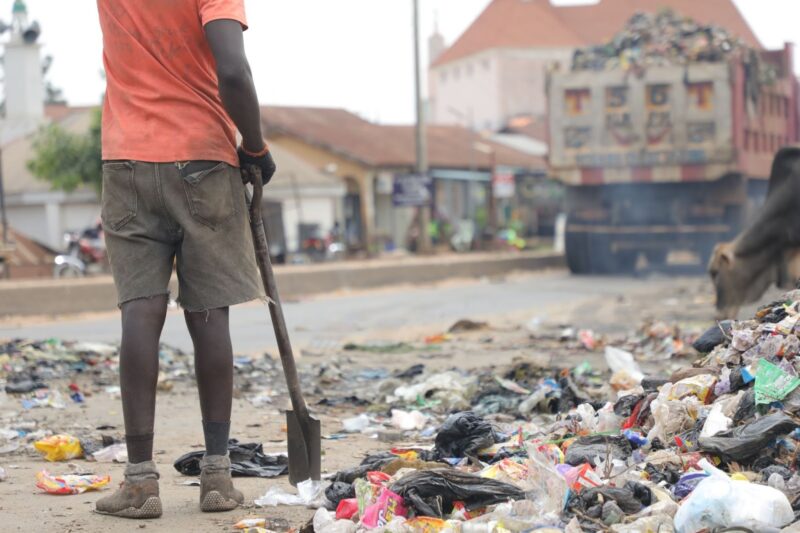Heaps of refuse have almost covered some major roads in Abuja following indiscriminate waste disposal by residents and commercial waste collectors, populalry konwn as Baban Boola.
When PREMIUM TIMES recently visited some roads in parts of the Abuja Municipal Council (AMAC), it was observed that residents and motorists were struggling to cope with the increasing accumulation of refuse on the roads and other public areas, resulting in traffic congestion.
For instance, in Kurudu area of the AMAC, the pile of refuse causes major traffic congestion every time on the road, especially during working hours.

“Every time this refuge is full, I get to work very late, even though I wake up as early as 5 a.m. This place will slow you down for about 30 minutes or more,” Dang Pam, a civil servant who lives in Karshi, lamented.
A commercial driver, who plies the road, Joseph Oyewale, also added, “It is so disheartening to see that after the road was renovated and commissioned, the next thing is now the refuse causing traffic congestion every day. Just imagine, it has even covered the whole road”, Mr Joseph lamented.

PREMIUM TIMES gathered the situation worsened this year when residents and the baban boola started dumping refuse around the space unchallenged.

On Thursday, the House of Representatives resolved to investigate the reason for the mounting refuse in the nation’s capital.
The resolution followed a motion of urgent national importance brought by the member representing Makarfi/Kudan federal constituency in Kaduna State, Umar Ajilo, who raised concern about the declining environmental and infrastructural conditions in Abuja.
Mr Ajilo lamented that the pile of refuse has become a permanent feature across several districts in the FCT, from satellite towns to highbrow neighbourhoods, while blocked drainage systems and malfunctioning streetlights have combined to worsen both flooding and insecurity.
Government should act
Some residents told this newspaper that government is deliberately ignoring the ugly development, noting that it would have been able to tackle it, if it was interested.
Ody David, a POS operator at the Kurudu market, said the government can stop it if they want to.
“There was a time a similar thing started at Kurudu market junction, it went on for a long time, until I think the then minister was informed, and that was how the task force came very early one day, and they arrested people. Since that time the madness stopped till date,” Mr David said.
The Federal Capital Territory Administration (FCTA) recently engaged new solid waste evacuation contractors to manage waste disposal in the territory.
During an interactive meeting with contractors last Friday, the Minister of FCT, Nyesom Wike, asked the contractors to ensure an efficient execution of their works, adding that no excuse would be tolerated.
“Management of waste is a very difficult job. So, I want to plead with you to see it as an assignment for the development of our capital city.
“So, please help us keep the city clean. It’s a job that you applied for, nobody forced you and I assure you that your payment is not a problem. Do the job as required and do it very well. There will be no favouritism. Your job is what will speak for you, and you must get the job done,” Mr Wike said.
The minister also stated that he would establish a Task Force to oversee the contractors’ operations, noting that payments would be contingent upon satisfactory performance.



New Method: Community service, waste operator…
Hannatu Ibrahim, Director of Environment, Abuja Municipal Area Council (AMAC), said the council was initiating new methods and laws to address the issue.
She said the problem is caused by the increasing and rapid development in Abuja, where most of its rural communities are turning into urban centres.
She said, the enforcement of community service and fines for illegal disposal of refuse has come up in the new amendment set up by her organisation to tackle the issue.
“We want to change our direction in terms of enforcement. It may not just be, you owe N10,000, you pay for the N10,000, and then you go. Now we want you to pay the N10,000, and you do some community work, or services.”
“You know we can’t do anything without the law. As I speak to you, the 2024 by-law will soon be out. And until it becomes a law, you cannot do anything. So I’m giving the assurance that the 2024 law will definitely be out, as soon as it’s assigned to the honourable chairman. And the fines have been increased,” she stated.
Community service in Nigeria includes various initiatives, including formal government programmes such as the National Youth Service Corps (NYSC) and the Nigerian National Volunteer Service (NNVS), along with grassroots volunteering organised by local and international NGOs.
These activities cover a wide range of efforts, from contributing to national development and security to addressing crucial sectors like education, food security, and healthcare. Additionally, community service can serve as a judicial punishment for individuals who breach specific laws or regulations within the country.
She also explained that the council is initiating a programme that will also aid in the rapid collection of waste, and also provide opportunities for the local dumpsters (Baban boola) to be trained and participate in a refined method.

“We want to open up this area to waste operators, divide the areas and then people come and pick, and they pay directly. So we realise that once we can do that, we can take care of our markets, the large markets that are also contributing to this waste. We take care of the residential area. We will virtually be seeing some sanity in these kinds of areas.
“And the idea is, once they pick the waste, they should take it to the final dump site, which is Karshi. That’s the official dump site for AMAC.”

“The waste operators are actually picking from the houses. The Baban Boola will cease to exist on their own. And our advice, too, would be that, because you also have areas that these vehicles may not be able to go. So we advise those companies (waste operators) to involve them (Baban Boola) and get them as part of the waste operators of each area.
“The waste operators, in addition to collecting your waste, will also be collecting some of these recyclables. That you can easily exchange as a client there and then. You don’t have to go far,” she added.
However, she said all these are still on paper and could not disclose when they will commence implementation.
“You know, we have to recruit them. They have to go through a process, and then we have to advertise. Once these administrative things are done, they’ll be handed over to us. And that’s where my job starts. What we need to do is to monitor and make sure that they go there. They pick this waste from home. Then we also monitor that the residents or the clients also pay for these services.”
She further stressed the effect of resident non-compliance and failure to pay for the services.
“These are some of the areas that are still pending from the time you have talked. People are not ready to pay for their waste. They can easily be forced to pay for lights, water. If you don’t pay, we cut it off. But for environmental issues, it’s always difficult. We need to go through a process of prosecuting waste. People don’t see it as something that should be part of their responsibility.”







READ ALSO: Nigeria govt adopts new accountability, financing reforms to achieve universal health coverage












